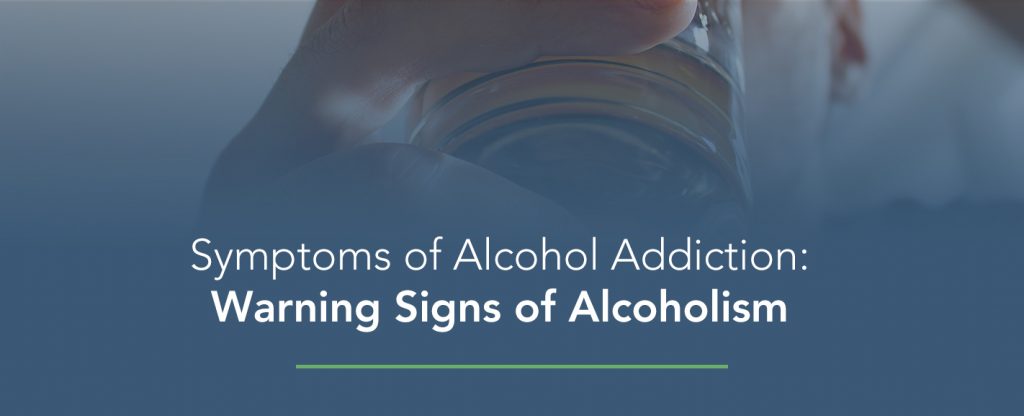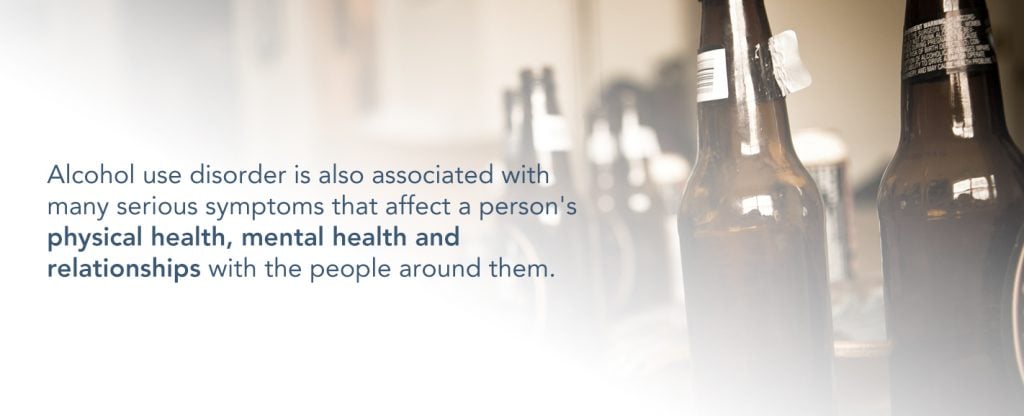
Alcohol is a normalized part of adult life. We go out for drinks with co-workers after a long day at the office. We unwind with a glass of wine or beer in the evening. We meet up with friends at a bar or restaurant. Even heavy drinking is normal in many situations, like college parties. With alcohol so ingrained in the social fabric of our lives, it can be difficult to recognize the warning signs of alcohol abuse.
How do you know if you have a serious drinking problem? First, it may be helpful to understand alcohol use disorders and how to recognize them. With this knowledge, you can educate yourself about the risk factors of alcohol use and determine how to get help.
What Is Alcoholism?
Alcoholism is a disease also known as alcohol use disorder. It is characterized by an inability to control your alcohol intake. Alcohol use disorder is also associated with many serious symptoms that affect a person’s physical health, mental health and relationships with the people around them.
The Diagnostic and Statistical Manual of Mental Disorders (DSM-5), a tool developed by the American Psychiatric Association, breaks down alcohol use disorder into two categories: alcohol abuse and alcohol dependence. Professionals diagnose these conditions after considering several different criteria and further classify the disorder as mild, moderate or severe, depending on the number of symptoms present. Someone with mild alcohol use disorder will experience two or three symptoms. As the disease progresses to moderate, the number of symptoms increases to four or five. When alcohol use disorder becomes severe, a person will struggle with six or more symptoms.
Alcoholism involves various symptoms, and it may look different in different people. However, the inability to quit drinking is the common factor shared by all people who struggle with alcohol addiction.

Prevalence of Alcoholism in the US
How common are excessive alcohol use and alcoholism in the United States? First, it is important to understand how to define moderate and excessive drinking. The Centers for Disease Control and Prevention (CDC) provides drinking guidelines to help reduce the risks associated with consuming alcohol.
According to the CDC, moderate drinking is one alcoholic beverage or less per day for women and two or less for men. The federal agency also recommends that certain people abstain from drinking entirely, including people who:
- Are pregnant.
- Are under the legal drinking age.
- Have certain medical conditions.
- Are in recovery from alcohol use disorder.
While these guidelines exist to help people who choose to drink do so responsibly, many people do not follow these guidelines. In the U.S., behaviors like binge drinking are common. A total of 25.8% of adults aged 18 and older reported binge drinking within the past month, according to research conducted in 2019.
When looking at a larger pattern, it becomes clear that alcohol addiction is prevalent in the United States. Approximately 14.5 million people struggle with alcohol use disorder. Despite extensive documentation of this issue, not everyone is able to get help. Less than 8% of the millions of people struggling with alcohol use disorder received any kind of treatment, according to the same research.
Unfortunately, alcohol use disorder has the potential to be fatal. Yearly, about 88,000 people in the United States will die from a cause related to alcohol.
Symptoms of Alcoholism
Alcoholism is characterized by many different symptoms, including both behavioral and physical ones. Behavioral symptoms include:
- Planning your drinking: Someone who is struggling with alcohol use disorder will find themselves spending an inordinate amount of time thinking about their next drink and planning their life around it. Will that upcoming social event have a bar? If not, you might decide to skip it. Do you have enough alcohol at home, or do you need to stop at the store on the way home from work?
- Prioritizing drinking over other responsibilities: Alcohol abuse and dependence almost always leak out into other areas of your life. You might miss an important work deadline, fight with your partner about how much you drink or forget some of your responsibilities as a parent. Yet, you keep drinking, despite how it affects your professional and personal life and relationships.
- Engaging in risky behavior: Alcoholism is associated with an increased likelihood of engaging in risky behavior. This type of behavior might mean having unprotected sex with a stranger or getting behind the wheel of a car while you are inebriated.
- Struggling to cut back: People who struggle with alcohol use disorder may notice their patterns of behavior and their growing reliance on alcohol. They may even decide to cut back or take a break from drinking, but alcoholism is an addiction. You may try to cut back only to find that you are unable to do so.
The physical symptoms of alcoholism include:
- Blackouts: Excessive drinking can lead to periods known as “blackouts.” A blackout occurs when you drink so much that it affects your brain’s ability to store memories. You may have periods where you have fragmented memories or periods where you remember nothing at all. If this happens frequently when you are drinking, it could be one of the signs of alcoholism. Blackouts tend to occur when blood alcohol concentrations reach 0.16% or higher.
- Hangovers: A hangover refers to the set of symptoms you feel after an episode of excessive drinking. You might experience dry mouth, thirst, muscle aches, light sensitivity, nausea, sweating and other unpleasant physical sensations. If you spend a significant amount of time hungover or find that you want to drink to manage the symptoms of a hangover, you may be struggling with an addiction.
- Alcohol withdrawal: Withdrawal is one of the serious complications of alcoholism. As the body becomes used to habitual drinking, the central nervous system makes adjustments to help keep you alert. The sudden cessation of alcohol intake does not change the state of your central nervous system, which leads to the symptoms of withdrawal.
During your withdrawal, you can experience mental and physical symptoms. You may feel anxious or even experience hallucinations, depending on the severity of withdrawal. Physical symptoms can include shaking hands, nausea, vomiting, sweating and difficulty with sleeping. Withdrawal typically ends within three days after you stop drinking, but it can be longer for some people.

Risks of Excessive Alcohol Use
Excessive drinking can have a significant impact on your health both in the short term and the long term.
Short-term risks include:
- Risk-taking behavior: Heavy drinking may lead you to partake in risky or even dangerous activities. Alcohol increases the likelihood of risky sexual behavior, which can lead to sexually transmitted diseases or unwanted pregnancies. The impaired judgment that comes with drinking alcohol can also lead to accidents or injuries, either due to driving under the influence or other issues like falls or accidental drowning. Drinking alcohol can also increase the chance of violent behavior.
- Alcohol poisoning: While many of the effects of alcohol are cumulative, excessive drinking can have an immediate and dangerous effect on your physical health.
Long-term risks include:
- Liver damage: Prolonged alcohol abuse can have a detrimental impact on your liver health. Over time, alcohol can lead to scarring and tissue damage. Alcoholic fatty liver disease, acute alcoholic hepatitis and alcoholic cirrhosis are some of the liver conditions that alcoholism can cause.
- Increased chance of certain cancers: Long-term alcohol dependence is associated with an increased risk of developing several different types of cancer, including breast cancer; liver cancer; colon cancer and cancer of the mouth, throat and esophagus.
- A weakened immune system: Over time, alcohol consumption can affect the immune system. Alcoholism can make you more susceptible to infections.
- Heart health problems: Heavy drinking over time can negatively affect your heart. Alcoholism increases the risk of high blood pressure, irregular heartbeat and cardiomyopathy. Long-term alcohol abuse can also increase the risk of experiencing a stroke.
- Mental health issues: Alcoholism and mental health issues can occur simultaneously. When seeking treatment, people may receive a dual diagnosis. Alcoholism can exacerbate existing mental health issues and increase the risk of developing new issues. Heavy drinking is associated with anxiety and depression.
- Impact on your memory: Drinking alcohol affects the brain. Over time, heavy drinking can cause short-term and long-term memory loss. Alcoholism can lead to the development of Wernicke-Korsakoff Syndrome, a type of dementia related to alcoholism.
Who Is at Risk of Developing an Alcohol Use Disorder?
The causes of alcoholism can be environmental and genetic. Risk factors for alcohol use disorder include:
- Peer pressure: Your environment and the people in it can play a role in your drinking habits. Teenagers and young adults can feel pressure to join in binge drinking with their peers. Even as you get older, peer pressure can still play a role. In many situations, alcohol is an expected element. Think about all the times you have been invited to go out for drinks with coworkers and friends or your family has opened a nice bottle of wine to celebrate a milestone occasion. Whether the people around you push you to drink, you can often feel pressure to join in with everyone else.

- Family history: Your genetics can play a role in your risk of developing an alcohol use disorder. You may inherit genes that play a role in factors like how your body processes alcohol, how you can control your behavior and how you manage stress. Additionally, children who see an immediate family member struggling with alcohol addiction are at risk of repeating those behaviors in their own lives.
- Stress: Stress is another common factor in all of our lives, but the amount of stress and coping strategies will differ from person to person. People who live with high levels of stress may find unhealthy ways of coping, including addictive behaviors like drinking alcohol.
- Mental health issues: Alcohol use disorder has been linked to numerous mental health issues. People who have mental health issues may use drinking to cope with their symptoms. Conditions like major depressive disorder, schizophrenia and personality disorders can be risk factors for developing an alcohol use disorder.
Types of Treatment for Alcohol Addiction
Getting treatment can help you manage the symptoms of alcohol addiction and give you the tools you need to move past your alcohol addiction. Treatment for alcohol addiction typically takes a multi-faceted approach, including:
- Medication: The Food and Drug Administration (FDA) has approved many drugs to treat alcohol addiction. These medications include disulfiram, naltrexone and acamprosate. Disulfiram changes how the body processes alcohol. If you drink alcohol while taking this drug, you will become sick. Naltrexone does not make you feel sick while drinking, but it does change how alcohol makes you feel. This medication eliminates the pleasure that comes with being drunk and can manage the cravings associated with withdrawal. Acamprosate can also help manage the symptoms of withdrawal.
- Cognitive-behavioral therapy: Cognitive-behavioral therapy (CBT) is a type of therapy that helps people to recognize negative thoughts and behavior patterns. It can help change how we think and react to the environment around us. If you struggle with addiction, CBT can help you recognize your triggers for drinking, improve your self-control and find healthier ways to cope with the stress in your life. This element of treatment involves talking with a licensed therapist and learning new ways to think and act.
- Group counseling: As a part of your treatment, you may sit down for group therapy sessions. These sessions allow you and other people struggling with similar issues to discuss your experiences. You may find these sessions to help you to build a support network. Group sessions provide a safe, supportive environment that allows you to relate to other people without judgment. The members of these sessions can share advice and help one another to build healthy coping mechanisms. Trained therapists lead group counseling sessions.
Treatment for alcohol addiction helps you achieve success in the present and over the long term. The exact treatment approach will differ from person to person, but help is available. Remember that treatment is a process that takes time. You might experience setbacks or have doubts, but you have the power to continue moving forward.
Personalized Addiction Treatment at Synergy Recovery Center
Synergy Recovery Center offers outpatient addiction treatment tailored to your needs. Our treatment center in Bakersfield, California, uses a combination of medication and counseling to help you come to terms with your addiction and move forward with sobriety. Our team is here to offer you their expertise and support in a compassionate, non-judgmental environment.
Alcohol dependence is a difficult condition to manage, but that’s why we are here. If you are ready to begin treatment, contact us to learn more about how we can partner with you on your journey to wellness.
Learn More About Alcohol Addiction:




